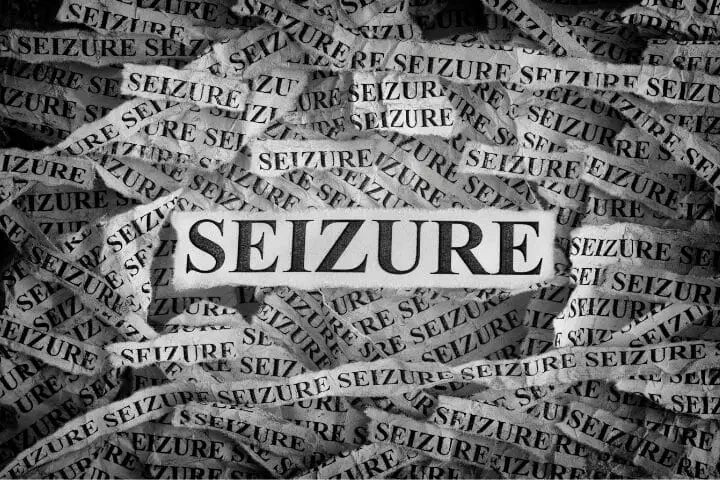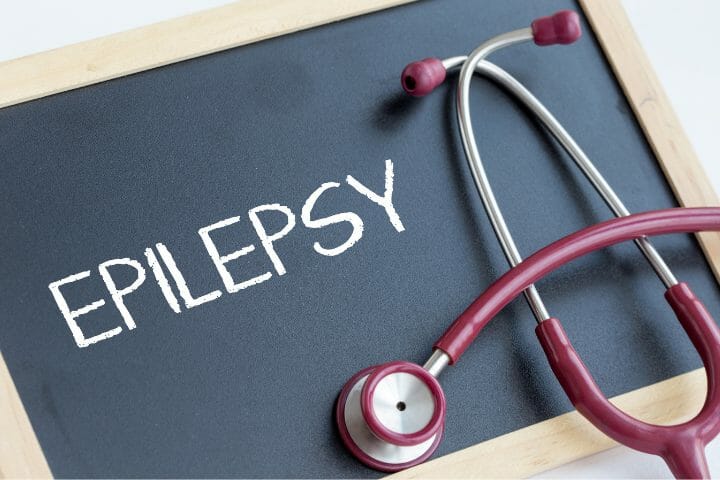A seizure can be caused by various medical events, but in all cases it can impede you from doing your wokr. But if you have seizures can you get disability? Does the SSA consider seizures as a disability in its blue book? Let’s find out.
Contents
If you have seizures, you may be wondering if you are eligible for disability benefits. Unfortunately, the answer is not always simple. Various medical conditions can cause seizures, and the eligibility rules vary depending on the cause of your seizures.
This article will explore whether you are eligible for disability based on your seizures and what steps to take if you need assistance filing a claim.

What is Epilepsy?
Epilepsy is a neurological condition. It either causes or increases the chances of unprovoked and recurring seizures. A seizure happens when there is a sudden disruption of the electrical activity in the brain that can cause various symptoms, including convulsions, muscle rigidity, loss of consciousness, and changes in behavior.
Epilepsy affects people of all ages but is most commonly diagnosed in children and young adults. It is estimated that 1 in 100 people worldwide will experience at least one seizure. In the United States, epilepsy affects more than 3 million people.
There are many types of seizures, and not all seizures indicate epilepsy. Epilepsy is only diagnosed when a person has had two or more unprovoked seizures that were not caused by an identifiable medical condition.
Causes
There is no single cause of epilepsy, but genetic and environmental factors are believed to cause epilepsy. In some cases, epilepsy may be due to an injury to the brain or a medical condition that affects the brain, such as a stroke or tumor. Epilepsy can also be inherited, although this is not always the case.

Treatments
Most people who have seizures because of epilepsy can control them using medication, but surgery may be necessary for some. There is no cure for epilepsy, but most people can live everyday, healthy lives with proper treatment.
You might also like to read: Can You Get Disability For Thyroid Disease?
The 5 Types of Epilepsy
Epilepsy is a condition that causes repeated seizures. Seizures are episodes of abnormal brain activity that can cause changes in your behavior, sensations, and muscle control. Epilepsy can be caused by many different factors, including injuries, brain tumors, stroke, and infections. There are many kinds of epilepsy, each with its own set of symptoms and treatment options.
Some of the most common types of epilepsy include:
- Idiopathic epilepsy: It is the most common type of epilepsy, accounting for about 60% of all cases. It occurs when there is no known cause for the seizures. Treatment options include medication and surgery.
- Cryptogenic epilepsy: This type of epilepsy accounts for about 25% of all cases. It is characterized by seizures with no known cause but may be due to an underlying brain injury or condition. Treatment options include medication and surgery.
- Symptomatic epilepsy: This type of epilepsy accounts for about 10% of all cases. It occurs when the seizures are caused by an underlying condition, such as a brain tumor, stroke, or infection. Treatment options depend on the underlying condition and may include medication, surgery, and other therapies.
- Genetic epilepsy: This type of epilepsy is due to a genetic mutation passed down in families. Treatment options include medication and surgery.
- Neurological epilepsy: This type of epilepsy is due to a neurological condition, such as Alzheimer’s disease or Parkinson’s disease. Treatment options depend on the underlying condition and may include medication, surgery, and other therapies.
If you or a loved one has been diagnosed with epilepsy, it is essential to work with a team of healthcare professionals to create a treatment plan that is right for you. There are many different types of epilepsy, and each type requires its unique approach to treatment.

The Financial Costs of Epilepsy
The financial costs of epilepsy can be significant. In the United States, the average annual price of epilepsy per person is approximately $15,414, including direct medical costs, indirect costs related to lost productivity, and caregiver costs.
Medical costs associated with epilepsy include both direct and indirect charges. Direct medical expenses are incurred directly due to the condition, such as doctor visits, hospitalizations, medications, and surgical procedures.
Indirect medical costs are not directly related to the disease. However, they may still be incurred due to it, such as transportation costs to and from appointments or missed workdays due to doctor visits.
Lost productivity costs are those associated with lost workdays or decreased productivity. These can be direct costs, such as when an employee with epilepsy is unable to work, or indirect costs, such as when an employee with epilepsy is less productive than usual.
You might also like to read: Can You Get Disability For Hashimoto’s Disease?
Social Security Disability for Seizure Disorder
A seizure disorder is a neurological condition that causes recurrent seizures. There are many different seizure disorders, and the severity can vary from person to person.
The main type of seizures are:
- Generalized Tonic-clonic seizures
- Atonic seizures
- Tonic seizures
- Clonic seizures
- Absence seizures
- Myoclonic seizures
Depending on the type of seizure, people experience either brief, isolated seizures, while others may have chronic, debilitating seizures that significantly interfere with their quality of life.
The Social Security Administration (SSA) recognizes that seizure disorders can be disabling and offers disability benefits to those who meet the SSA’s eligibility requirements. To qualify for Social Security disability benefits, you must first have worked enough quarters to earn sufficient work credits. Total work credits you need depends on your age when you become disabled.
Once you have met the work credit requirement, you must prove that your seizure disorder is severe enough to meet or equal a listing in the SSA’s “Blue Book” of disabling conditions. The Blue Book is a listing of impairments that the SSA has determined are so severe that they automatically qualify an individual for disability benefits.
Suppose your seizure disorder does not meet or equal a listing. In that case, you may still be eligible for benefits if you can prove that your condition prevents you from performing any work consistently.
The SSA will consider your age, education, past work experience, and frequency of dyscognitive seizures to issue a residual functional capacity (RFC) when making this determination.

How Does SSA Evaluate Seizures & What Are The Medical Qualifications?
The Social Security Administration (SSA) evaluates seizures and other neurological impairments according to the requirements in the Blue Book or the SSA’s official listing of disabling conditions.
To qualify for benefits based on a seizure disorder, you must have medical evidence documenting at least one seizure that occurred within the last year, despite treatment. Suppose you have not had an attack in the previous year.
You may still qualify for benefits if you have a medically determined risk of having another seizure and your condition stops you from taking part in a substantial gainful activity (SGA).
To be found disabled, you must have a inability for physical functioning and earn a living due to seizures or other neurological impairments. When evaluating your claim, the SSA will consider
- The type of seizures you experience
- How often they occur
- How long they last
- Any associated symptoms, and
- How well your condition is controlled by medication.
The SSA will also consider any other impairments you may have that contribute to your overall disability.
Suppose you think you may qualify for Social Security disability benefits based on a seizure disorder. In that case, it is essential to gather as much medical evidence as possible to document the frequency, severity, and effects of your seizures. This can include records from your treating physician, neurologist, and any hospitalizations or emergency room visits related to your condition.
It would help to keep a seizure diary detailing when your seizures occur, how long they last, any associated symptoms, and how well they are controlled by medication. This information can help support your claim.
If you have questions about whether you qualify for Social Security disability benefits, or need help with your application, consider speaking with a qualified disability attorney or advocate. They can help review your case and determine the best way to proceed.
You might also like to read: Can You Get Disability For Sciatica?
Qualifying for Epilepsy Under a Medical-Vocational Allowance
There are two ways to qualify for epilepsy under a medical-vocational allowance. The first way is to show that your condition prevents you from engaging in a SAG. The second way is to show that your situation meets or equals a listing in the Social Security Administration’s “Blue Book” of disabling conditions.
To show that your condition prevents you from engaging in a SAG, you will need to provide evidence from a medical professional that your condition causes marked limitation in your ability to perform basic daily activities. This evidence must be consistent with the symptoms and limitations described in your application and supporting documentation.
To show that your disease meets or equals a listing in the “Blue Book” of disabling conditions, you must provide medical evidence that meets the specific criteria for that listing. For epilepsy, this includes proof of:
- An EEG showing epileptic activity
- A detailed description of your seizures, including how often they occur and how long they last
- Information about any medications you are taking to control your seizures
- Evidence of how your condition has affected your ability to function in work and other daytime activities

Applying for Disability Benefits for Epilepsy
When you have epilepsy, it can be challenging to maintain employment. This is especially true if your seizures are not well-controlled. If you cannot work because of your epilepsy, you may be eligible for disability benefits through the Social Security Administration (SSA) under the listing 11.0 of the Blue Book.
The SSA has a specific listing for epilepsy in its “Blue Book” of disabilities. To qualify for benefits under this listing, you must have documented frequent seizures that occur at least once every month, despite treatment. You must also have evidence of one of the following:
- A condition that interferes with your ability to control your seizures
- A situation that causes frequent falls or fainting spells
- A condition that limits your activities so that you are in danger of injuring yourself or others
If you do not meet the criteria for the epilepsy listing, you may still be eligible for benefits if your condition has severely limited your ability to work. To qualify under this “medical-vocational allowance,” the SSA will consider your age, education, past work experience, and any transferable skills you may have.
The best way to apply for disability benefits is online at www.ssa.gov. You can also call the SSA at 1-800-772-1213 to make an appointment to apply in person. When you apply, be sure to have information about your medical history, including names and contact information for your doctors and other healthcare providers.
Applying for disability benefits can be a long and complicated process, but it is essential to remember that you are not alone.

Epilepsy in the Workplace and the ADA
Epilepsy is a neurological issue that can cause seizures. Seizures can vary in intensity and frequency and range from mild to severe. Epilepsy can affect people of all ages but is most commonly diagnosed in childhood or adolescence.
According to the CDC, about 3 million adults in the United States have epilepsy. Epilepsy is considered a disability under the ADA.
The ADA prohibits discrimination against individuals with disabilities in employment, public accommodations, transportation, and other areas of life. The ADA also requires employers to provide reasonable accommodations to employees with disabilities.
Reasonable accommodations for employees with epilepsy may include:
- flexible work schedules
- modifications to the workplace (e.g., removing hazards that could trigger a seizure)
- access to an employee assistance program
- time off for medical appointments
If you have epilepsy and seek employment, it is essential to disclose your condition to potential employers. This will allow them to make accommodations that will help you be successful in your job. For more information about the ADA and how it affects people with epilepsy, please visit the Epilepsy Foundation website.
You might also like to read: Can You Get Disability For Crohn’s Disease?
Tips for Getting SSD for a Seizure Disorder
If you have a seizure disorder, you may be eligible for Social Security disability benefits. To qualify for benefits, you must be able to show that your condition prevents you from working. Here are some tips to help you get the benefits you need.
- Get a diagnosis of epilepsy or other seizure disorder from a doctor. To receive benefits, you must have a formal diagnosis of a seizure disorder from a medical professional. Be sure to keep copies of all medical records and test results.
- Keep track of your epileptic seizures. It will be better to keep a diary or log of your seizures, noting when they occur, how long they last, and any other information. This will give your doctor a better idea of the severity and frequency of your condition.
- Be consistent with your treatment. If you are prescribed medication or therapy, it is essential to be consistent with your medicine. Keep all appointments and follow your doctor’s instructions.
- Cooperate with the Social Security Administration. The Social Security Administration will need to gather information about your condition to decide on your benefits claim. Be sure to cooperate fully and provide any requested information promptly.
Following these tips can help you get the Social Security disability benefits you need if you have a seizure disorder. If you have any questions about the process, speak with your doctor or a Social Security representative.

Frequently Asked Questions
1. Can seizures cause permanent damage?
Seizures can cause various short- and long-term effects, depending on their severity and how often they occur. While most attacks don’t cause permanent damage, some can lead to serious health problems, such as brain damage or death. If you have chronic (recurring) seizures, it’s essential to work with your doctor to find the best treatment plan to minimize the risks and help you live a healthy, seizure-free life.
2. Does epilepsy affect memory?
Epilepsy can cause problems with memory, both in the short-term and long-term. In the short term, seizures can interfere with the ability to form new memories or recall recent events. This is called anterograde amnesia.
Long-term epilepsy can lead to problems with memory and cognition, such as difficulty learning new information or retaining information over time. This is known as dementia. Dementia from epilepsy differs from Alzheimer’s disease but shares some similar symptoms.
3. Can you work if you have seizures?
If you have seizures, you may be able to continue working. However, based on the type and severity of your seizures, you may need to make some adjustments. For example, you may need to take breaks more often or avoid certain types of work tasks. You may also need to use special safety equipment, such as a helmet or mouthguard.
Wrap Up
Getting disability benefits for seizures can be difficult because in most cases they can be controlled through medication. If you apply, the SSA will consider the severity of your disease and whether it is truly impacting your ability to do gainful work.
Thank you for reading the article, we hope we answered all your questions. If you have more queries, do write to us in the comments box, we will be happy to answer all your queries.
